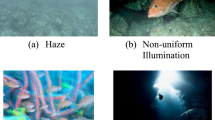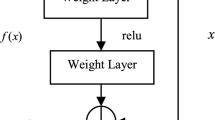Abstract
The classification of underwater fish species holds significant importance for fisheries management. Nevertheless, existing deep fish classification models require high computational resources, which hamper their deployment on underwater devices. Additionally, the complex underwater environment, the camouflaged appearance of fish, and the similarity among fish species pose challenges to the accuracy of lightweight fish classification models. To address the above issues, this paper proposes a novel two-tier knowledge distillation (T-KD) method to improve the accuracy and reduce the parameters of the underwater fish species classification models. Specifically, the T-KD involves the following key steps. Firstly, a new fish species dataset, Fish37, is constructed to augment the diversity of fish species present in existing datasets. Subsequently, we introduce a novel interlayer map** similarity-preserving (IMSP), to facilitate the learning of richer discriminative features by capturing the map** relationships between teacher and student network layers. Moreover, a new layer tail response (LTR) is proposed to mimic the predictions of the teacher network, efficiently improving classification performance and generalization capability. The proposed T-KD approach demonstrates remarkable performance in fish species classification, surpassing that of well-known lightweight models. The effectiveness of T-KD is extensively validated across various network depths, including ResNet and EfficientNet, and compared to other knowledge distillation methods like KD, PKT, RKD, and SP. Notably, T-KD outperforms MobileNetv3-large and obtains an impressive Top-1 accuracy of 97.20% on the Fish37 dataset only using about 1/15 model size of Vision Transformer. Furthermore, detailed generalization experiments are conducted to assess T-KD’s performance on popular benchmark datasets, such as A_Large_Scale_Fish_Dataset, Fish4knowledge, WildFish and WildFish++. In conclusion, the results indicate the potential of the T-KD to facilitate underwater fish species classification with limited computational resources on underwater devices. This research also opens up promising avenues for the practical implementation of lightweight fish classification models.










Similar content being viewed by others
Data availability
The datasets used for the generalization experiments in this paper are publicly available from the dataset owners upon reasonable request.
References
Ben Tamou A, Benzinou A, Nasreddine K (2022) Live fish species classification in underwater images by using convolutional neural networks based on incremental learning with knowledge distillation loss. MAKE 4:753–767. https://doi.org/10.3390/make4030036
Boom BJ, Huang PX, He J, Fisher RB (2012) Supporting ground-truth annotation of image datasets using clustering. In: Proceedings of the 21st International Conference on Pattern Recognition (ICPR 2012), Tsukuba, Japan, pp 1542–1545
Borza DL, Ileni TA, Marinescu AI, Darabant SA (2023) Teacher or supervisor? Effective online knowledge distillation via guided collaborative learning. Comput Vis Image Underst 228:103632. https://doi.org/10.1016/j.cviu.2023.103632
Boudiaf A, Guo Y, Ghimire A, Werghi N, De Masi G, Javed S, Dias J (2022) Underwater image enhancement using pre-trained transformer. In: Proceedings of the International Conference on Image Analysis and Processing (ICIAP 2022), Guangdong, China, pp 480–488. https://doi.org/10.48550/ARXIV.2204.04199
Chhabra HS, Srivastava AK, Nijhawan R (2020) A hybrid deep learning approach for automatic fish classification. In: Proceedings of the Emerging Trends in Information Technology (ICETIT 2019), pp 427–436. https://doi.org/10.1007/978-3-030-30577-2_37
Dosovitskiy A, Beyer L, Kolesnikov A, Weissenborn D, Zhai X, Unterthiner T, Dehghani M, Minderer M, Heigold G, Gelly S, Uszkoreit J, Houlsby N (2021) An image is worth 16x16 words: transformers for image recognition at scale. In: Proceedings of the 9th International Conference on Learning Representations (ICLR 2021), Vienna, Austria. https://doi.org/10.48550/ar**v.2010.11929
He K, Zhang X, Ren S, Sun J (2016) Deep residual learning for image recognition. In: Proceedings of the IEEE/CVF Conference on Computer Vision and Pattern Recognition (CVPR 2016), Las Vegas, USA. http://arxiv.org/abs/1512.03385
Hinton G, Vinyals O, Dean J (2015) Distilling the knowledge in a neural network. In: Proceedings of the 28th Annual Conference on Neural Information Processing Systems (NIPS 2014), Montréal, Canada. https://doi.org/10.48550/ar**v.1503.02531
Howard A, Sandler M, Chu G, Chen L-C, Chen B, Tan M, Wang W, Zhu Y, Pang R, Vasudevan V, Le Q, Adam H (2019) Searching for MobileNetV3. In: Proceedings of the IEEE/CVF International Conference on Computer Vision (ICCV), Seoul, Korea (South), pp 1314–1324. https://doi.org/10.1109/ICCV.2019.00140
Hu X, Zhu S, Peng T (2023) Hierarchical attention vision transformer for fine-grained visual classification. J Vis Commun Image Represent 91:103755. https://doi.org/10.1016/j.jvcir.2023.103755
Iqbal MA, Wang Z, Ali ZA, Riaz S (2021) Automatic fish species classification using deep convolutional neural networks. Wireless Pers Commun 116:1043–1053. https://doi.org/10.1007/s11277-019-06634-1
Kandimalla V, Richard M, Smith F, Quirion, Torgo L, Whidden C (2022) Automated detection, classification and counting of fish in fish passages with deep learning. Front Mar Sci 8:823173. https://doi.org/10.3389/fmars.2021.823173
Kim T, Oh J, Kim N, Cho S, Yun S-Y (2021) Comparing Kullback-Leibler divergence and mean squared error loss in knowledge distillation. In: Proceedings of the International Joint Conference on Artificial Intelligence (IJCAI 2021), Montreal, Canada. https://doi.org/10.48550/ARXIV.2105.08919
Knausgård KM, Wiklund A, Sørdalen TK, Halvorsen K, Kleiven AR, Jiao L, Goodwin M (2022) Temperate fish detection and classification: a deep learning based approach. Appl Intell 52:6988–7001. https://doi.org/10.1007/s10489-020-02154-9
Li L, Shi F, Wang C (2022) Fish image recognition method based on multi-layer feature fusion convolutional network. Ecol Inform 72:101873. https://doi.org/10.1016/j.ecoinf.2022.101873
Liu T, Li P, Liu H, Deng X, Liu H, Zhai F (2021) Multi-class fish stock statistics technology based on object classification and tracking algorithm. Ecol Inform 63:101240. https://doi.org/10.1016/j.ecoinf.2021.101240
Ma N, Zhang X, Zheng H-T, Sun J (2018) ShuffleNet V2: practical guidelines for efficient CNN architecture design, In: Proceedings of the IEEE/CVF Conference on Computer Vision and Pattern Recognition (CVPR 2018), Salt Lake City, USA. https://doi.org/10.48550/ar**v.1807.11164
Mathur M, Goel N (2021) FishResNet: automatic fish classification approach in underwater scenario. SN Comput Sci 2:273. https://doi.org/10.1007/s42979-021-00614-8
Pang J, Liu W, Liu B, Tao D, Zhang K, Lu X (2021) Interference distillation for underwater fish recognition. In: Proceedings of the Asian Conference on Pattern Recognition (ACPR 2021), pp 62–74. https://doi.org/10.1007/978-3-031-02375-0_5
Paraschiv M, Padrino R, Casari P, Bigal E, Scheinin A, Tchernov D, Fernández Antaet A (2022) Classification of underwater fish images and videos via very small convolutional neural networks. JMSE 10:736. https://doi.org/10.3390/jmse10060736
Park W, Kim D, Lu Y, Cho M (2019) Relational knowledge distillation, In: Proceedings of the IEEE/CVF Conference on Computer Vision and Pattern Recognition (CVPR 2019), Long Beach, USA. https://doi.org/10.48550/ar**v.1904.05068
Passalis N, Tefas A (2018) Learning deep representations with probabilistic knowledge transfer. In: Proceedings of the IEEE/CVF European Conference on Computer Vision (ECCV 2018), Munich, Germany, pp 268–284. https://doi.org/10.48550/ar**v.1803.10837
Prasetyo E, Suciati N, Fatichah C (2022) Multi-level residual network VGGNet for fish species classification. J King Saud Univ - Comput Inform Sci 34:5286–5295. https://doi.org/10.1016/j.jksuci.2021.05.015
Rosette Z, Nina P (2020) The influence of water quality parameters on fish species abundance and distribution near shoreline of Lake Victoria. Afr J Environ Nat Sci Res 3:1–12
Shah SZH, Rauf HT, IkramUllah M, Khalid MS, Farooq M, Fatima M, Bukhari SAC (2019) Fish-Pak: fish species dataset from Pakistan for visual features based classification. Data Brief 27:104565. https://doi.org/10.1016/j.dib.2019.104565
Simonyan K, Zisserman A (2015) Very deep convolutional networks for large-scale image recognition. In: Proceedings of the IEEE/CVF Conference on Computer Vision and Pattern Recognition (CVPR 2014), Boston, USA. https://doi.org/10.48550/ar**v.1409.1556
Tan M, Le QV (2020) EfficientNet: rethinking model scaling for convolutional neural networks. In: Proceedings of the36th International Conference on Machine Learning (ICML 2019), Long Beach, USA. https://doi.org/10.48550/ar**v.1905.11946
Tung F, Mori G (2019) Similarity-preserving knowledge distillation. In: Proceedings of the IEEE/CVF Conference on Computer Vision and Pattern Recognition (CVPR 2019), Long Beach, USA. pp 1365–1374. https://doi.org/10.48550/ar**v.1907.09682
Ulucan O, Karakaya D, Turkan M (2020) A large-scale dataset for fish segmentation and classification. In: Proceedings of the Innovations in Intelligent Systems and Applications Conference (ASYU 2020), Istanbul, Turkey, pp 1–5. https://doi.org/10.1109/ASYU50717.2020.9259867
Villon S, Iovan C, Mangeas M, Claverie T, Mouillot D, Villéger S, Vigliola L (2021) Automatic underwater fish species classification with limited data using few-shot learning. Ecol Inform 63:101320. https://doi.org/10.1016/j.ecoinf.2021.101320
** Y, Zhang W, Zhou F, Tang X, Li Z, Zeng X, Zhang P (2023) Transmission line fault detection and classification based on SA-MobileNetV3. Energy Rep 9:955–968. https://doi.org/10.1016/j.egyr.2022.12.043
Yu X, Wang J, Zhao Y, Gao Y (2023) Mix-ViT: mixing attentive vision transformer for ultra-fine-grained visual categorization. Pattern Recognition 135:109131. https://doi.org/10.1016/j.patcog.2022.109131
Zheng Y, Deng L, Lin Q, Xu W, Wang F, Li J (2022) KRS-Net: a classification approach based on deep learning for koi with high similarity. Biology 11:1727. https://doi.org/10.3390/biology11121727
Zhuang P, Wang Y, Qiao Y (2018) WildFish: a large benchmark for fish recognition in the wild. In: Proceedings of the 26th ACM international conference on Multimedia, Seoul, Korea, pp 1301–1309. https://doi.org/10.1145/3240508.3240616
Zhuang P, Wang Y, Qiao Y (2021) Wildfish++: a comprehensive fish benchmark for multimedia research. IEEE Transactions on Multimedia 23:3603–3617. https://doi.org/10.1109/TMM.2020.3028482
Funding
This paper was supported by the National Key Research and Development Program of China under Grant 2022YFD2001701 and Special Project for Technology Innovation and Application Develo** of Chongqing under Grant CSTB2022TIAD-ZXX0053.
Author information
Authors and Affiliations
Contributions
Beibei Li: methodology, conceptualization, investigation, data curation, visualization, writing — original draft, writing – review and editing. Yiran Liu: data curation, investigation. Qingling Duan: project administration, funding acquisition, supervision, writing — review and editing.
Corresponding author
Ethics declarations
Competing interests
The authors declare no competing interests.
Additional information
Handling Editor: Gavin Burnell
Publisher’s note
Springer Nature remains neutral with regard to jurisdictional claims in published maps and institutional affiliations.
Rights and permissions
Springer Nature or its licensor (e.g. a society or other partner) holds exclusive rights to this article under a publishing agreement with the author(s) or other rightsholder(s); author self-archiving of the accepted manuscript version of this article is solely governed by the terms of such publishing agreement and applicable law.
About this article
Cite this article
Li, B., Liu, Y. & Duan, Q. T-KD: two-tier knowledge distillation for a lightweight underwater fish species classification model. Aquacult Int 32, 3107–3128 (2024). https://doi.org/10.1007/s10499-023-01314-1
Received:
Accepted:
Published:
Issue Date:
DOI: https://doi.org/10.1007/s10499-023-01314-1




